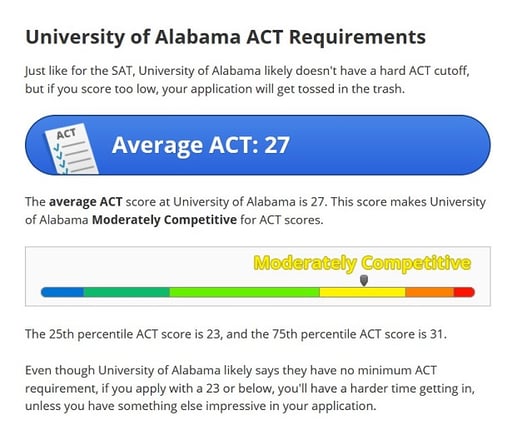
For many high school students, taking standardized tests has been one of the key requirements of applying to colleges. However, with the rise of test-optional schools and other ways of evaluating college applicants, do you have to take the ACT? This guide will answer that question by explaining circumstances when the ACT is required, why fewer students need to take the ACT these days, and how you can decide what to do. By the end of this guide, you'll be able to know for sure whether or not you should take the ACT.
Do You Have to Take the ACT?
If you're wondering, "Do I have to take the ACT?" the short answer is that it depends! Some students are required to take the ACT for one or more of the reasons we go over in the next section, some take the SAT instead of the ACT, and some graduate high school and attend college without taking any standardized tests at all. Keep reading to learn which decision is best for you.
4 Reasons to Take the ACT
When do you have to take the ACT? There can be multiple reasons, and we explain four of the most common below.
#1: Colleges You're Applying to Require It
The most obvious reason you would need to take the ACT is if one or more of the colleges you're applying to requires standardized test scores. As we discuss in the next section, more and more schools have become test optional, however; there are still many schools that require test scores from applicants or that will begin requiring test scores again once the COVID-19 pandemic is over and students can easily sign up to take the ACT and other tests.
If you're applying to a school that requires test scores, there's typically no way around this requirement, so expect to take the ACT or SAT if you want your application to be considered.
#2: Your High School Requires It
Even if none of the colleges you're applying to require the ACT, you might still have to take it because your high school or state requires it. Currently, 12 states administer the ACT to every high school junior. They are:-
- Alabama
- Hawaii
- Kentucky
- Louisiana
- Mississippi
- Montana
- Nebraska
- Nevada
- North Carolina
- North Dakota
- Utah
- Wisconsin
- Wyoming
If you attend high school in one of these states, you'll be taking the ACT! Even if you don't live in one of these states, your school/city/county may still require the ACT. Why do these requirements exist? Schools and states use them to evaluate student skills and measure test scores across years. In-school ACTs also can be helpful to students because it gives them official ACT scores without having to pay for the exam or travel to a testing center on the weekend.
#3: Enrichment Programs Require It
Certain camps or programs, especially those that are more competitive, may also require ACT or other test scores. This is particularly true for programs designed for academically high-achieving students. Like colleges, these programs use standardized test scores to ensure applicants have the skills they need to succeed in their classes and activities.
#4: Scholarships Require It
Some scholarships require or highly recommend standardized test scores. There are also certain schools that don't require test scores for admission but do require them if you want to be considered for financial aid. So if you, like most people, are planning on getting financial aid to help pay for college, check to see if those sources require the ACT or other test scores. Otherwise, you could lose out on tens of thousands of dollars in financial aid.

Why You Might Be Able to Skip the ACT
If you don't want to take the ACT, you're in luck: more colleges are becoming test optional, a trend that saw a jump in popularity as a result of the COVID-19 pandemic. The pandemic made it difficult or impossible for many high school students to take standardized tests that are normally required by colleges. As a result, a huge number of colleges made test scores optional for at least 2020/2021 admissions. Many of these decisions are temporary, but a significant number of schools have stated that they may not go back to requiring standardized test scores. Currently, over 900 colleges in the US are test optional, and we only expect that number to grow over time.
So, if colleges don't have test scores to look at when evaluating applicants, what do they use instead? It depends on their exact stance on tests. Colleges that are "test flexible" allow other scores, such as AP tests or IB tests, to take the place of ACT or SAT scores. Some test flexible schools include NYU, Middlebury College, and the University of Rochester. Colleges will use those scores in place of traditional ACT/SAT test scores and evaluate them similarly.
Schools that are "test optional" allow students to decide if they want to submit ACT/SAT scores or not. If a student chooses not to, the school uses other parts of college applications to evaluate them, such as grades, class rank, extracurriculars, letters of recommendation, and extracurriculars. Each of those components will get weighted a little more than they normally would to take the place of the test scores.
Schools that are "test blind" don't look at ACT or SAT scores even if you do submit them, so all applicants are evaluated without those scores. Test blind colleges are quite rare, although all of the University of California schools were required to be test blind for the 2020/2021 admissions cycle. Schools with permanent test blind policies include Dickinson College and Hampshire College.
Should You Take the ACT Even If It's Not Required?
Hopefully, you're now able to answer the question, "Do you need to take the ACT?" However, even if you don't need to take the ACT, should you still take it? Again, the answer depends on your own circumstances.
First, consider scholarships or other financial aid packages you're hoping to receive. These can be worth a lot of money and, if they require or highly recommend test scores, it'd be well worth your while to spend some time preparing for and taking the ACT.
But what if you've ruled out the other considerations, and you're just trying to decide whether to take the ACT to submit scores to test optional schools? Will taking the ACT give you a leg up, even if it's not required? That depends on two factors: how strong you expect your ACT scores to be and how strong the rest of your application is.
Think of it this way: to get into a school, you have to meet a certain level of "impressiveness." Each component of your application--grades, test scores, letters of rec, extracurriculars, class rank, personal statement, etc.--has the potential to make you more impressive to colleges.
So, what you need to decide is 1.) if you need an added boost to your application, and 2.) if an ACT score will give it to you. If you already have a strong application and are confident across the board in what you're submitting to colleges, then you might not need to take the ACT, especially if you don't feel that your scores would be particularly strong.
However, if you think your application needs a boost to make you a competitive candidate, and you think you could earn strong ACT scores, then it would be to your benefit to take the ACT, and it could really help your college applications.
How do you know what a "good" ACT score is? We have an entire article on it, but, in general, a strong ACT score is one at least at the school's 75th percentile for ACT scores. Hitting that goal means that your ACT score is higher than the ACT scores of 75% of accepted students at that school. To learn the 75th percentile of any school, Google "[school name] PrepScholar ACT." Here's an example for the University of Alabama:

Scroll down to find the 75th percentile composite ACT scores for admitted students. The 75th percentile score for University of Alabama is 31, so that's the score you'd want to aim for to have an ACT score that really helps your application.
If you're not sure how well you think you'd do on the ACT, take some practice tests to get an idea of how you're scoring. Also know that it's possible to make significant increases in your ACT score if you study smart and put in the time. Even with the rise of test optional schools, a higher ACT score can significantly increase your chances of getting into a particular school. Additionally, raising your ACT score is often faster and easier than strengthening other parts of your application, such as raising your GPA or gaining more experience at your extracurriculars. So, if you're trying to increase your odds of getting into your dream school, aiming for a higher ACT is one of the simplest ways to do so.
In general, strong standardized test scores are still a great thing to have on your college applications, especially as many top colleges continue to get more competitive each year. We recommend that you give the ACT a shot and see how well you do. If you're unhappy with your scores, you don't need to submit them to schools that are test optional. And who knows, you may do better than you expect and be able to submit an even stronger application than you thought!
Summary: Do I Need to Take the ACT for College?
If you're wondering "do you have to take the ACT?" know that the answer will highly depend on your own circumstances. You might need to take the ACT for college applications, because your state or high school requires it, for enrichment programs you're applying to, or for financial aid or scholarships. However, as more colleges become test optional, more high school students may be able to get into their dream school without having to take any standardized tests. However, if you think your application needs a boost and you also think you could score well on the ACT, it may still be a good idea to take the test, even if it isn't required. Strong test scores continue to be very attractive to colleges, even if they don't require them.

What's Next?
Have you taken the ACT already but are unhappy with your score? Use our guide to decide whether you should retake the ACT.
Not sure when to take the ACT? Get a complete study plan for the ACT to figure out the best date for you.
Aiming for a top ACT score? Read our guide on how to get a perfect ACT score, written by a full scorer.
Want to improve your ACT score by 4+ points? Download our free guide to the top 5 strategies you need in your prep to improve your ACT score dramatically.
Have friends who also need help with test prep? Share this article!

Christine graduated from Michigan State University with degrees in Environmental Biology and Geography and received her Master's from Duke University. In high school she scored in the 99th percentile on the SAT and was named a National Merit Finalist. She has taught English and biology in several countries.


































 Holly R.
Holly R.